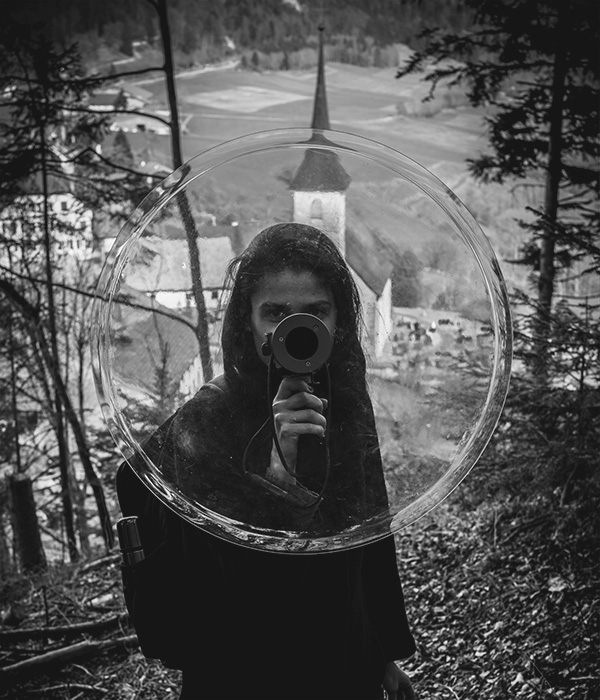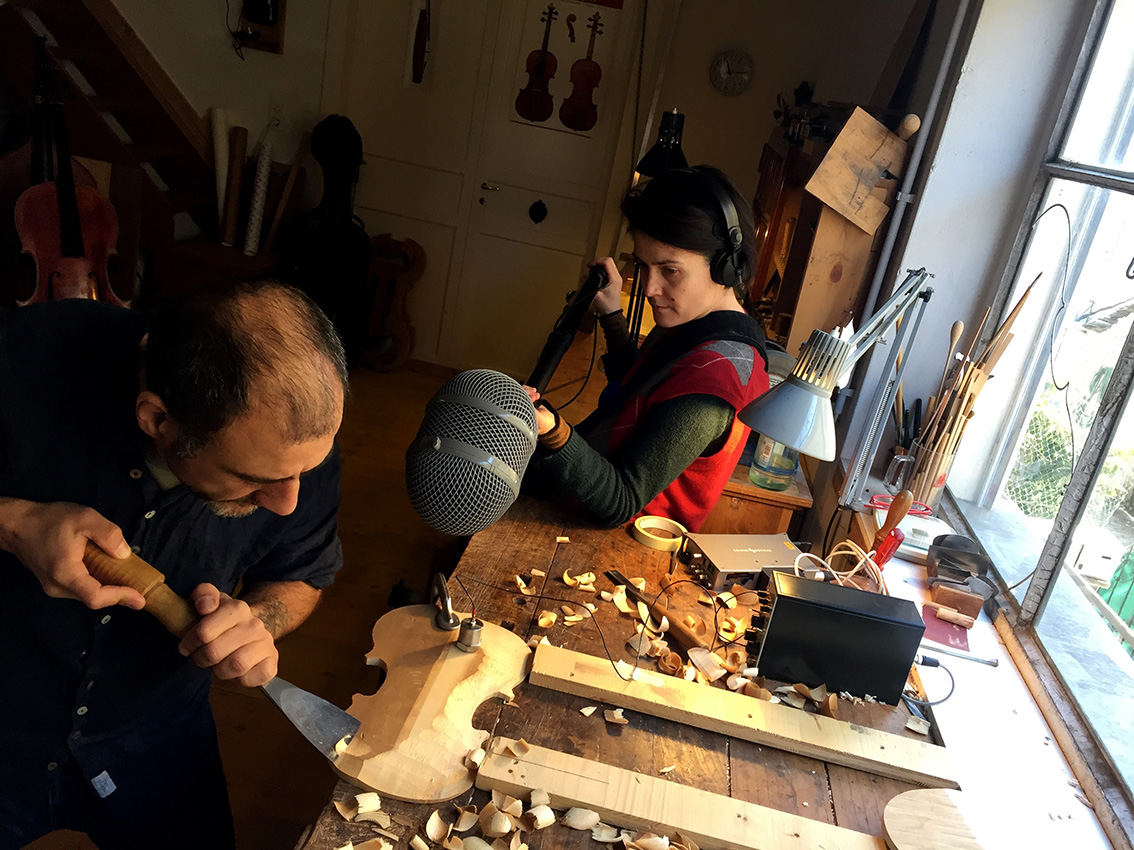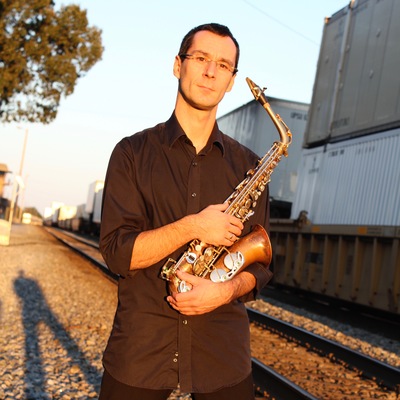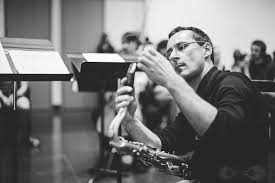Gabrielle Weber
‘Wood, mouth, ritual, possession’ and ‘multiple speakers’. This year’s edition of Geneva’s traditional contemporary music Festival Archipel does not focus on one main theme only, but on several individual motifs. The artistic directors, Marie Jeanson and Denis Schuler, wish to tell stories and create unexpected encounters, with a playful, light-hearted approach and special focus on shared experiences.
Jeanson, organiser of experimental and improvised music, together with Schuler, composer, curated their first joint festival edition in 2021. Although online because of the pandemic, the edition was successful and able to offer plenty of concerts and encounters between musicians, despite the lack of an actual live audience. This year, the festival’s main venue – ‘Maison communale de Plainpalais‘ – will feature music around the clock during ten days and also become a meeting place. In addition to the extensive concert programme – with composer-in-residence Clara Jannotta or a series on Alvin Lucier – sound installations, shared meals prepared by musicians, nightly salons d’écoute with performers presenting their favourite works in Dolby Surround, or pannels as well as mediation workshops will be featured. In addition, a festival radio programme will broadcast around the clock daily and the programme offers numerous other events spread throughout the city.
The motifs are a hidden thread running through the entire festival, with various composers closely involved and spinning their own stories. Geneva composer Olga Kokcharova is one of them and I spoke with her about her multi-part festival project ‘sculpter la voûte‘ – shaping the vault.

“We have lost our connection to the environment and sound can restore it,” says Kokcharova. The delicate, almost shy composer of powerful natural soundscapes dedicates her central festival project to wood.
Sculpter la voûte is based on several years of research in which Kokcharova studied the growth of trees in Ticino forests. In the process, she examines wood as a sound producer as well as the forest as condition for human culture.
In spring 2021, Kokcharova recorded sounds in a natural reserve in the south of Switzerland. “One can hear the physiological activity of the trees. These are almost brutal, raw sounds – deep sonorities, cracking. You sense that there are forces at play that go far beyond human,” she explains.
Kokcharova is originally from Siberia and emigrated to Switzerland at the age of 16. She experienced a real cultural shock, but also a boost of inspiration. In Siberia, she grew up surrounded by nature, far away from cities and did not know anything about European culture.
In Geneva, she first studied architecture, design and fine arts, then piano and composition. Sound has been important to her from the very beginning. Today she works especially with natural sounds and field recordings, integrating them into compositions, installations, soundwalks, sound performances or film music, for festivals and institutions at home and abroad.
Olga Kokcharova and Antoine Läng, Venera, 2018
Kokcharova’s work is always concerned with larger connections and the relationship between people and their environment.
Trees cracking as they grow – raw, brutal sounds
In the premiere of Sculpter la voûte- ‘altération’ for amplified loudspeakers, a composition commissioned by the festival and at the same time the first part of her project, she presents the sounds recorded in Ticino through an orchestra of loudspeakers. The forest sound is realistically spatialised by an ambisonic system, a space-spanning ‘dome of loudspeakers’, created in collaboration with ZHdK Zurich, which will also be used for other performances during the festival, such as the Swiss premiere of Luis Naón’s string quartet with électronique ambisonique, performed by Quatuor Diotima on the previous evening.
Kokcharova, on the other hand, supplements these ambisonics with an Akusmonium, a system of additional loudspeakers, whereby she strongly alienates the sound with ‘altérations’.
“It’s like resurrecting the forest. One is directly in touch with the sound of life that inhabits it: you feel you are in the midst of it.”
For Kokcharova, the forest is not a place of relaxation, on the contrary it triggers highest concentration, creating connections with things we do not understand and she draws attention to this through alienations in her piece.
Olga Kokcharova, Mixotricha Paradoxa – part II, 2019
Performance installatique et sensorielle
The second part of Sculpter la voûte – ‘auscultation‘, is a collaboration with Geneva’s Ensemble Contrechamps, as a performance installatique et sensorielle. In her installation, Kokcharova traces the sound path of wood: from the living tree, vibrating through the circulation of its sap, to the tonewood, which becomes an instrument in the hands of the violin maker and then comes to life with the musician. This happens tangibly, in the truest sense of the word, as one of Ensemble Contrechamps’ musicians will play for each individual member of the audience. The latter can truly feel the instrument, trace its sound and vibration, and thus experience his or her own expérience vibratoire.
Pour entendre le son on a besoin de la matière...
Sound is vibration: it is our connection to the world, says Kokcharova. In order to hear sound, a material, for example wood, is needed. For Kokcharova, this connection also creates a larger context that secretly shapes us: “When we talk about the history of mankind, the focus is always on humans, tools or animals. Plants are never mentioned – but without plants, mankind wouldn’t exist”. She is interested in showing how other life forms – in this case trees – influence all aspects of our lives as well as our cultural production.
Man and nature have always had a relationship, says Kokcharova, so for her festival project she chose to tell a somewhat different, very personal story of wood and man.
Gabrielle Weber

Festival Archipel Genève: april, 1-10th Geneva
Clara Ianotta, Italian composer is artist in residence and present at the festival.
Alvin Lucier, dem 2021 verstorbenen US-Elektropionier ist eine Hommage mit drei Performance-Installationen gewidmet.
Antoine Läng, Quatuor Diotima, Denis Schuler, Marie Jeanson
mentioned events:
Saturday, 2.4.: world premiere Olga Kokcharova ‘Sculpter la voûte– altération’, and ‘Mycenae Alpha‘ by Iannis Xenakis (1978), in honour of his 100th birthday, Olga Kokcharova at ‘système ambisonique‘.
3.-10. April: Olga Koksharova: Sculpter la voûte – ‘auscultation‘:
Saturday, 9.4., 14h: Gespräch ‘arbre, bois, vibration, transmission‘ with Ernst Zürcher, writer, and Christian Guidetti, lute.
radiofeatures SRF 2 Kultur:
in: Musikmagazin, Sa, 2.4.22, 10h /So, 3.4.20h, by Benjamin Herzog: Café with Olga Kokcharova, editor Gabrielle Weber
Musik unserer Zeit, Mi, 22.6.22, 20h/Sa, 25.6.22, 21h: storytelling at Festival Archipel Genève 2022, editor Gabrielle Weber
profiles neo-mx3:
Festival Archipel, Olga Kokcharova, Contrechamps, Luis Naon



